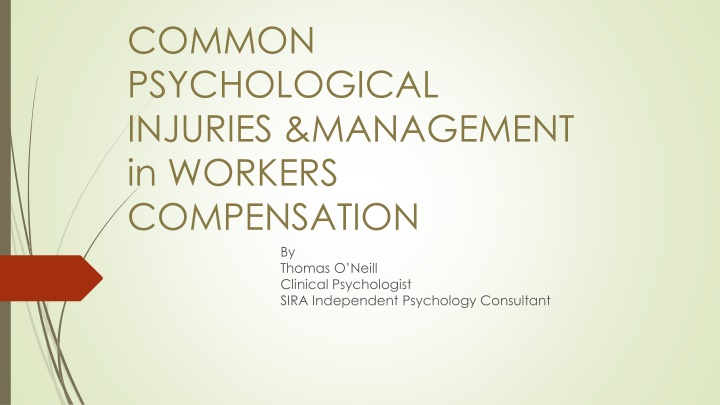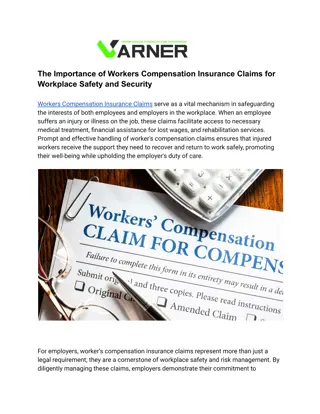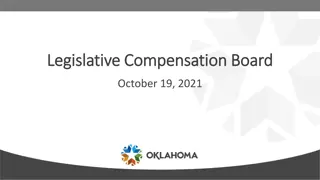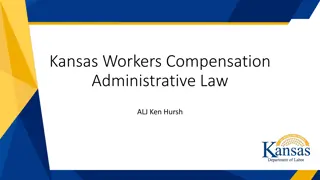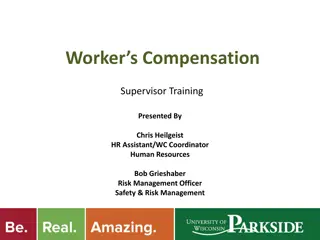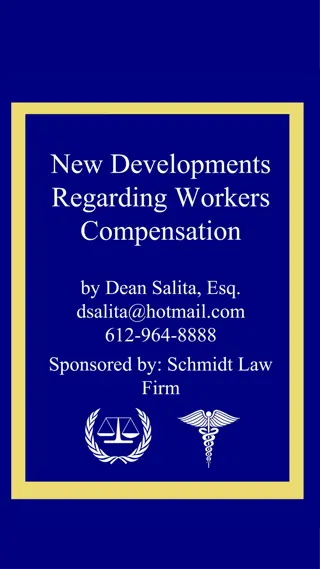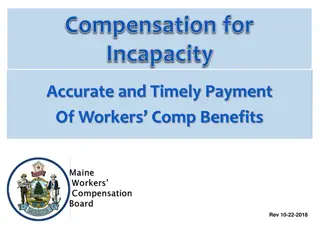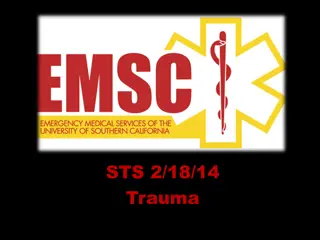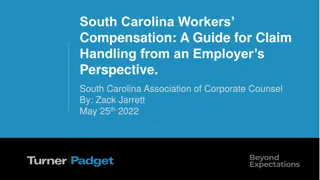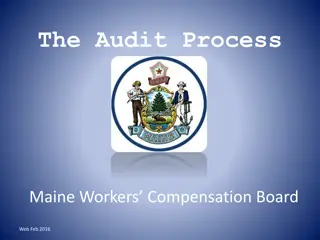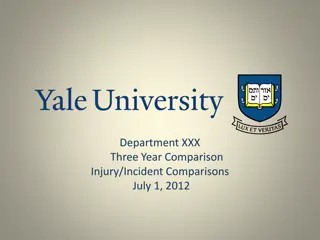COMMON PSYCHOLOGICAL INJURIES &MANAGEMENT in WORKERS COMPENSATION
Discover insights on common psychological injuries, such as adjustment disorders, depression, and PTSD, prevalent in the workplace. Gain knowledge on identifying signs, symptoms, and providing crucial support as a case worker. Learn about good mental health, stress responses, and ways to manage psychological injury claims in NSW.
Download Presentation

Please find below an Image/Link to download the presentation.
The content on the website is provided AS IS for your information and personal use only. It may not be sold, licensed, or shared on other websites without obtaining consent from the author.If you encounter any issues during the download, it is possible that the publisher has removed the file from their server.
You are allowed to download the files provided on this website for personal or commercial use, subject to the condition that they are used lawfully. All files are the property of their respective owners.
The content on the website is provided AS IS for your information and personal use only. It may not be sold, licensed, or shared on other websites without obtaining consent from the author.
E N D
Presentation Transcript
COMMON PSYCHOLOGICAL INJURIES &MANAGEMENT in WORKERS COMPENSATION By Thomas O Neill Clinical Psychologist SIRA Independent Psychology Consultant
LEARNING OUTCOMES At the end of the session participants will: Be able to identify the most common psychological injuries diagnosed in the workplace and types of treatments available for that particular diagnosis Identify with the signs and symptoms of someone with a psychological injury and be able to provide best possible support as a case worker
WHAT IS GOOD MENTAL HEALTH? Good Mental Health is a sense of well-being, confidence and self esteem that enables us to participate in a meaningful world of relationships, activity, social and occupational participation. It may involve determination and Purpose. It does not involve a pervasive sense of happiness and joy!
Thus, the STRESS RESPONSE Is the complex interaction between the COPING SKILLS of the person AND The DEMANDS of the ENVIRONMENT
Psychological Injury Claims in NSW Risen from a steady 6% of all claims, to Now 12% in the last 3 years Most Common are adjustment disorders, followed by depression and then PTSD Major causes - bullying and harassment, enmeshed for personality and workplace dynamics, then cumulative exposure to trauma and chronic stress
ADJUSTMENT DISORDERS 1. The development of emotional or behavioural symptoms in response to an identifiable stressor occurring within three months of the onset of the stressor 2. The symptoms or behaviours are clinically significant as evidenced by (a) marked distress that is out of proportion to the severity or intensity of the stressor, taking into account external context, and cultural factors that might influence symptom severity and presentation, and/or (b) Significant impairment in social, occupational or other area of functioning THE IS THE SOFTER DIAGNOSIS THAT PSYCHIATRISTS and PSYCHOLOGISTS GIVE
Mood Disorders Distinguishing normal sadness and grief from depression Persistent depressed mood > 2 weeks Loss of interest & pleasure in things previously enjoyed And 3 of the following Reduced or increased interest in food & sex Sleep disturbance, trouble getting out of bed Fatigue & low energy Problems with concentration, attention to detail & absenteeism Procrastination & missed deadlines More negativity in self-talk and conversation with peers
Management approaches Symptoms No capacity Invite conversation into wellbeing, reassure, show compassion & patience Do not diagnose Review structure and routine, alternative hours, and temporary adjustment of workload Avoid negative criticism any feedback should be provided in a supportive structured way WHAT DO YOU NEED? HOW CAN I HELP?
GENERALISED ANXIETY DISORDER
Management tips in CM Clarify what the concern is, and allow a brief period of ventilation (10-15 minutes) too much ventilation can often lead to escalation of distress and hyperventilation Stay calm, supportive and maintain a focus on what solutions are needed and placing work worries in perspective Focus on one point at a time if there are multiple worries this may require several phone calls Develop a written management plan/solutions if stuck if you or the worker is overwhelmed
Psychological Treatment Cognitive Behavioural Therapies (incudes Interpersonal therapy, Acceptance and Commitment Therapy) for adjustment mood and anxiety discussions Scheme average 14 sessions Trauma Focused intervention for PTSD (CBT, exposure therapies, EMDR, cognitive processing, behavioural activation) 10-12 sessions for single incident 20-30 for complex trauma When medication may be required Flags : Dialectical behavioural Therapy for borderline personality disorder and/complex PTSD),psychodynamic psychotherapy, general chats and advocacy, legal advice when sessions reach 30-150 sessions & compensation processes
Treatment resources APS literature Review: evidence-based-psych-interventions.pdf (psychology.org.au) Clinical Handbook: https://www.guilford.com/books/Clinical-Handbook-of- Psychological-Disorders/David-Barlow/9781462547043 SIRA: Work-connected interventions for people with psychological injuries - SIRA (nsw.gov.au) SIRA Clinical Framework fort AHP: Workers compensation guide for allied health practitioners - SIRA (nsw.gov.au)
AHRR Do request when required and monitor progress How to ask questions about the plan Can you identify smart goals Psychologists who do not comply (no plans, fees, no IC involvement) Seeing 2 therapists Paying privately and Medicare NEW AHRRS How much is R&N Tx 14; the 20-40 range: 60-150 range
IPC Treatment Reviews Purpose Biopsychosocial model to address barriers Refer after 16 sessions or if significant flags seen early on Letting the worker and psychologist/counsellor know about the process IPC referral Timing SIRA S new compliance powers
3 TYPES OF IPC REVIEW 1. When a Stage 1 file treatment review may be of benefit 2. Stage 2 treatment reviews most common (90%) Phone call with psychologist within 2 weeks of referral Time constraints Documents required (AHRRs, recent COCs, IMEs and other info deemed helpful) Psychologist s engagement, and agreement on outcomes 3. Stage 3 treatment reviews when no agreement on 2, complexity and need to assess and review the flags in more detail. Eg., PD, untreated PTSD, Dependency on therapy, not unusual that a number will have signs of feigning, especially when legal
Determining work capacity in psychological injuries Self-reports are unreliable and do not reflect actual capacity Capacity as defined by sustained ability to complete a variety of work and non-work related roles Work hardening Testing out beliefs True Psychological Functional Capacity Assessments
Q & A? THANK YOU! Thomas O Neill 02 9362 0386 thomas@thomasoneill.com.au
